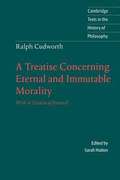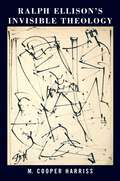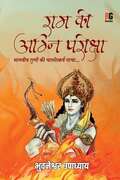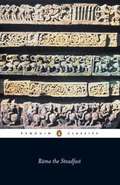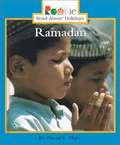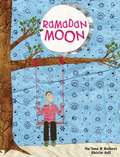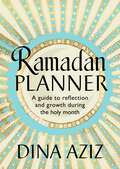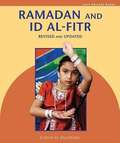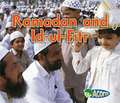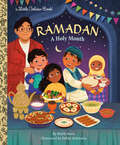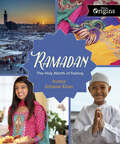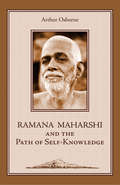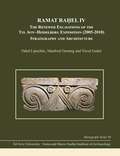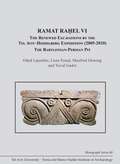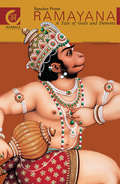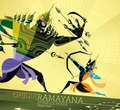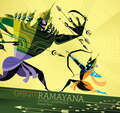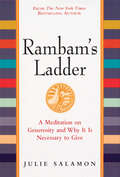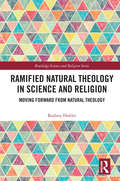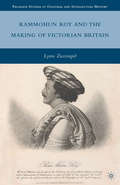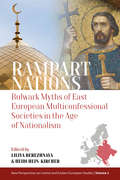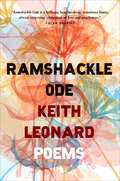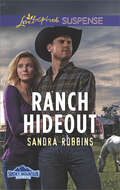- Table View
- List View
Ralph Cudworth: A Treatise Concerning Eternal And Immutable Morality - With A Treatise Of Freewill
by Karl Ameriks Desmond M. Clarke Ralph Cudworth Sarah HuttonRalph Cudworth (1617-1688) deserves recognition as one of the most important English seventeenth-century philosophers after Hobbes and Locke. In opposition to Hobbes, Cudworth proposes an innatist theory of knowledge which may be contrasted with the empirical position of his younger contemporary Locke, and in moral philosophy he anticipates the ethical rationalists of the eighteenth century. A Treatise Concerning Eternal and Immutable Morality is his most important work, and this volume makes it available, together with his shorter Treatise of Freewill, with a historical introduction, a chronology of his life, and an essay on further reading.
Ralph Ellison’s Invisible Theology (North American Religions)
by M. Cooper HarrissExamines the religious dimensions of Ralph Ellison’s concept of race Ralph Ellison’s 1952 novel Invisible Man provides an unforgettable metaphor for what it means to be disregarded in society. While the term “invisibility” has become shorthand for all forms of marginalization, Ellison was primarily concerned with racial identity. M. Cooper Harriss argues that religion, too, remains relatively invisible within discussions of race and seeks to correct this through a close study of Ralph Ellison’s work.Harriss examines the religious and theological dimensions of Ralph Ellison’s concept of race through his evocative metaphor for the experience of blackness in America, and with an eye to uncovering previously unrecognized religious dynamics in Ellison’s life and work. Blending religious studies and theology, race theory, and fresh readings of African-American culture, Harriss draws on Ellison to create the concept of an “invisible theology,” and uses this concept as a basis for discussing religion and racial identity in contemporary American life.Ralph Ellison’s Invisible Theology is the first book to focus on Ellison as a religious figure, and on the religious dynamics of his work. Harriss brings to light Ellison’s close friendship with theologian and literary critic Nathan A. Scott, Jr., and places Ellison in context with such legendary religious figures as Reinhold and Richard Niebuhr, Paul Tillich and Martin Luther King, Jr. He argues that historical legacies of invisible theology help us make sense of more recent issues like drone warfare and Clint Eastwood’s empty chair.Rich and innovative, Ralph Ellison’s Invisible Theology will revolutionize the way we understand Ellison, the intellectual legacies of race, and the study of religion.
Ram Charit Manas - Part 5 Sundar Kand
by Dr T. K. BansalThe Sundar Kand is a revered part of the Ram Charit Manas, focusing on Hanuman's heroic journey to Lanka. After receiving the blessing of Jambavan, Hanuman embarks on a mission to find Sita, who has been abducted by the demon king Ravana. Displaying great strength and devotion, Hanuman leaps across the ocean, overcomes various challenges, and meets Sita in the Ashoka grove. He reassures her of Rama's impending arrival to rescue her, gives her Rama's ring as a token of hope, and returns to Rama with news of her well-being. Along the way, Hanuman demonstrates incredible valor by burning down Lanka and defeating numerous demons. This episode symbolizes unwavering devotion, courage, and the ultimate triumph of good over evil. The part in this book captures in brief the essence of Hanuman's mission and heroism, central to the Sundar Kand.
Ram Ki Agni Pariksha: राम की अग्निपरीक्षा
by Bhuwaneshwar Upadhyayपौराणिक उपन्यास "मानवीय गुणों की चर्मोत्कर्ष गाथा : राम" बाल्मीकि रामायण की मूल प्रासंगिक घटनाओं को आधार बनाकर राम के जीवन चरित्र को उद्घाटित एवं विश्लेषित करने वाली एक औपन्यासिक रचना है। वैचारिक, मनोवैज्ञानिक, धार्मिक एवं समसमायिकता के मूल सिद्धांतों के आधार पर विभिन्न संवादों और चर्चाओं के माध्यम से इस कृति में रामयण की अनेक और महत्वपूर्ण घटनाओं को पुनः नये सिरे से परिभाषित करने का प्रयास किया है। इस उपन्यास की मुख्य विशेषता इसके तार्किक संवादों, नवीन प्रस्तुतिकरण, और विश्लेषणात्मकता है। जो पाठक को राम के जीवन को एक अलग दृष्टि से जानने और समझने के लिए प्रेरित करती है और मस्तिष्क में उभरे कई प्रश्नों के उत्तर भी देती है, जैसे कि राम की मानवीय जीवन यात्रा कैसे ईश्वरत्व तक पहुँच गई। कालखंड और उत्पन्न परिस्थितियाँ के मध्य स्थापित आदर्श मानवीय जीवन और उसके नैतिक मूल्यों को कैसे प्रभावित करते हैं? आदि... इस कृति में श्रीराम एक सहज और मर्यादित मानवीय जीवन जीते हुए केवल मर्यादापुरुषोत्तम ही नहीं, बल्कि एक ऐसे नायक बनकर उभरते हैं जो उपदेश नहीं देता और न आदेश, बल्कि अपने कठोर निर्णयों, त्याग और पुरुषार्थ के द्वारा उच्चादर्शों और मानवीय मूल्यों को अपनी जीवनशैली में शामिल किया और स्वयं आदर्श स्थापित किये।
Rama the Steadfast: An Early Form of the Ramayana (Penguin Classics)
by Mary Brockington Valmiki John BrockingtonWarrior-prince Rama is about to be crowned Young King, when he hears the devastating news that his father, King of Ayodhya, has been tricked into banishing him to the forest. His devoted wife Sita insists on accompanying him in exile, but the evil ten-headed lord Ravana has fallen deeply in love with the beautiful princess and steals her away. Aided by Hanuman, mighty captain of the monkeys, Rama sets out across the world to find her and destroy Ravana in a deadly battle. Rama the Steadfast was composed in the oral tradition in about the fifth century BC and has been retold over the generations ever since. With its fantastical characters ranging from monsters to apes, a very human hero and its profound moral purpose, it is one of the greatest of all Indian tales.
Ramadan (Rookie Read-About Holidays)
by David F. MarxRamadan is a month on the Muslim calendar devoted to prayer, friendship, meditation, and fasting for people of the Islamic faith. This Rookie Read-About Holiday book introduces children to this Muslim holiday, using colorful photos and simple text to encourage them to read on their own. Read these other Rookie Read-About Holidays books: Chanukah, Christmas, Chinese New Year, Columbus Day, Diwali, Earth Day, Easter, Halloween, Independence Day, Kwanzaa, Labor Day, Martin Luther King Jr. Day, Memorial Day, New Year's Day, Passover, Presidents' Day, Rosh Hashanah and Yom Kippur, Thanksgiving, Valentine's Day. Picture descriptions present.
Ramadan Moon
by Na'Ima B. RobertMuslims all over the world observe Ramadan and the joyful days of Eid-ul-Fitr at the end of the month of fasting as the most special time of year. This lyrical and inspiring picture book captures the wonder and delight of this great annual event.
Ramadan Planner: A guide to reflection and growth during the holy month
by Dina AzizAn essential guide to devotion and growth in the holy month of Ramadan.Ramadan isn't just about not eating for prolonged periods of time, it's about working on ourselves - our character and imaan - and setting goals, replacing bad habits and working on our spirituality.It's a time to focus on personal growth and to help others where we can.The month of Ramadan is a time for reflection, self-improvement, personal growth, and of heightened devotion and worship, but the pressures and stresses of day-to-day life can sometimes make it feel hard to keep track of all your good intentions. From suhoor to iftar and beyond, this Ramadan Planner is here to help guide you through the month of Ramadan. Full of helpful checklists, reminders, journal prompts, and spaces to reflect - whether you're fasting or exempt - get ready to track your progress through the holiest month:Set and keep track of your goals for the month aheadCheck-in on your mood and mental healthFast mindfully and plan your suhoor and iftar mealsStay focused on your goals and good intentionsKeep track of your prayers for each dayMake a list of du'as and note down your good deedsCreate space to reflect on the highs and lowsPrepare for Eid-ul-Fitr celebrations Schedule your day to make the most of the month________________________________________________________What readers are saying about The Ramadan Planner:"So amazing that I wanted to share it with my family and friends""Incredible . . . I have been looking for something like this for a long time""The best! It's made Ramadan easier for me and many others""This has made a massive difference in how I'm using the days of Ramadan""So easy to follow . . . I don't know what I would have done without it""Using this planner is the most productive and closest to God I have been for any Ramadan"
Ramadan and Id al-Fitr (Best Holiday Books)
by Dianne M. MacmillanAuthor Dianne M. MacMillan explores the Muslim holidays of Ramadan and Id al-Fitr. Readers will learn about the beginnings of Islam and the symbols and traditions of this important religion. They will also be introduced to the month-long fast of Ramadan and the joyous Id al-Fitr celebration that follows.
Ramadan and Id-ul-Fitr
by Nancy DickmannThis book introduces readers to what it means to celebrate Ramadan and Id-ul-Fitr, and shows them why this holiday is special.
Ramadan: A Holy Month (Little Golden Book)
by Malik AminLearn why and how Muslim families celebrate Ramadan with this beautifully illustrated Little Golden Book!Ramadan Mubarak! Teach children about the holy month of Ramadan--the tradition of fasting, what the Qur'an is, what kind of food is served between fasts, and how a modern family celebrates. Filled with colorful illustrations and simple, yet informative text, this Little Golden Book is perfect to share with your family this Ramadan!
Ramadan: The Holy Month of Fasting (Orca Origins #5)
by Ausma Zehanat KhanThe month of Ramadan offers the opportunity to improve one's personal and spiritual behavior. By focusing on positive thoughts and actions, Muslims build a closer connection with God and come away from the month feeling spiritually renewed. Ramadan: The Holy Month of Fasting explores the richness and diversity of the Islamic tradition by focusing on an event of great spiritual significance and beauty in the lives of Muslims. Rich with personal stories and stunning photographs, Ramadan demystifies the traditions and emphasizes the importance of diversity in a world where Islamophobia is on the rise. The epub edition of this title is fully accessible.
Ramana Maharshi And The Path Of Self-Knowledge
by Arthur OsborneARTHUR OSBORNE has collected in this small volume all of the essential information relating to the life and teachings of Sri Raman Maharshi (1879-1950), one of the foremost sages of modern India. As a teenager, Sri Ramana realized the Self through a spontaneous act of self-enquiry without conscious effort or special training imparted by a teacher. In 1896 he left his home at Madurai and came to Arunachala (Tiruvannamalai), where he lived as an all-renouncing sage in a state of continuous Self-realization for fifty-four years--until his mahanirvana in 1950. Included in this volume are instructions given by Sri Ramana to early devotees, such as Sivaprakasam Pillai, Frank Humphreys, Kavyakanta, Natesa Mudaliar, and others, as well the experiences of Paul Brunton and other later devotees. Sri Ramana's central message is that Self-knowledge us not something to be acquired afresh but rather a becoming aware of one's own natural state of Pure Being through Self-enquiry. The teachings of Sri Ramana Maharshi represent the essence of the Advaita Vedanta, the quintessential expression of Hindu spirituality.
Ramat Raḥel IV: The Renewed Excavations by the Tel Aviv–Heidelberg Expedition (2005–2010): Stratigraphy and Architecture (Monograph Series of the Sonia and Marco Nadler Institute of Archaeology #39)
by Oded Lipschits Manfred Oeming Yuval GodotThis is the first of a three-volume final report on the Tel Aviv–Heidelberg Renewed Excavations at Ramat Raḥel, 2005–2010. It presents the stratigraphy and architecture of the excavation areas, including portions of the palatial compound, the subterranean columbarium complex, and the Late Roman cemetery; site formation of the tell; twentieth-century fortifications at the site; and the ancient garden and its water installations.
Ramat Raḥel VI: The Renewed Excavations by the Tel Aviv–Heidelberg Expedition (2005–2010). The Babylonian-Persian Pit (Monograph Series of the Sonia and Marco Nadler Institute of Archaeology #40)
by Oded Lipschits Manfred Oeming Liora Freud Yuval GadotThis is part of a three-volume final report of the renewed excavations at Ramat Raḥel by the Tel Aviv–Heidelberg Expedition (2005−2010). It presents the finds from the Babylonian-Persian pit, one of the most dramatic find-spots at Ramat Raḥel. The pit yielded a rich assemblage of pottery vessels and yhwd, lion, and sixth-century "private" stamp impressions, including, for the first time, complete restored stamped jars, jars bearing two handles stamped with different yhwd impressions, and jars bearing both lion and "private" stamp impressions on their bodies. Residue analysis was conducted on many of the vessels excavated from the pit to analyze their contents, yielding surprising results. The finds contribute to our understanding of the pottery of the Babylonian and early Persian periods (6th−5th centuries BCE) and to the study of the development of the stamped-jar administration in the province of Yehud under Babylonian and Persian rule.Also available from Eisenbrauns: Ramat Raḥel III: Final Publication of Aharoni'’s Excavations at Ramat Raḥel (1954, 1959–1962) by Oded Lipschits, Yuval Gadot, and Liora Freud; and Ramat Raḥel IV: The Renewed Excavations by the Tel Aviv–Heidelberg Expedition (2005–2010): Stratigraphy and Architecture, by Oded Lipschits, Mandred Oeming, and Yuval Gadot.
Ramayana
by B. G. Sharma Ranchor PrimeFrom the kingdom of Ayodhya to the isle of Lanka, we are transported to a land that has inspired morality and spiritual tradition for thousands of years. Rama, the king of Ayodya, comes to life through B.G. Sharma's never-before-seen compositions of this classic epic. From his intimate devotee, Hanuman, to his loving Queen, Sita, we are endeared to both text and illustration as these uniquely devotional paintings propel us through the story and into the heart of the Ramayana.
Ramayana: Divine Loophole
by Sanjay PatelArtist and veteran Pixar animator Sanjay Patel lends a lush, whimsical illustration style and lighthearted voice to one of Hindu mythology's best-loved and most enduring tales. Teeming with powerful deities, love-struck monsters, flying monkey gods, magic weapons, demon armies, and divine love, Ramayana tells the story of Rama, a god-turned-prince, and his quest to rescue his wife Sita after she is kidnapped by a demon king. This illustrated tale features over 100 colorful full-spread illustrations, a detailed pictorial glossary of the cast of characters who make up the epic tale, and sketches of the work in progress. From princesses in peril to gripping battles, scheming royals, and hordes of bloodthirsty demons, Ramayana is the ultimate adventure story presented with an unforgettably modern touch.
Ramayana: Divine Loophole
by Sanjay PatelA 21st century retelling of a 2500-year-old story: Artist and veteran Pixar animator Sanjay Patel lends a lush, whimsical illustration style and lighthearted voice to one of Hindu mythology's best-loved and most enduring tales.Teeming with powerful deities, love-struck monsters, flying monkey gods, magic weapons, demon armies, and divine love, Ramayana: Divine Loophole tells the story of Rama, a god-turned-prince, and his quest to rescue his wife Sita after she is kidnapped by a demon king.From princesses in peril to gripping battles, scheming royals, and hordes of bloodthirsty demons, this incredible retelling of the classic Ramayana for kids is the ultimate adventure story presented with an unforgettably modern touch.Fans of Sanjay Patel's books, including The Little Book of Hindu Deities and Ganesha's Sweet Tooth, will be entranced by this ancient story brought to life with more than 100 dazzlingly colorful illustrations. Readers of all ages who love Hindu as well as Celtic, Roman, Chinese, and Greek mythology, and mythological creatures, will enjoy this timeless tale and its essential themes of duty, honor, and loyalty.RAMAYANA ILLUSTRATED FOR A NEW GENERATION: Even readers familiar with this ancient tale will find delight and new understanding in these pages. This keepsake volume includes more than 100 colorful full-spread illustrations, a detailed pictorial glossary of the cast of characters who make up the epic tale, and sketches of the work in progress.GREAT FAMILY READ-ALONG: A hit with parents eager for enthralling books to share with the whole family, Ramayana: Divine Loophole's "incredible illustrations and simple story for kids make this perfect bedtime reading for children aged five and above . . . [A] fun, technicolor way to introduce Hindu mythology to your children." (theswaddle.com)PIXAR ARTIST AUTHOR: Sanjay Patel is a wildly talented artist whose work as an animator and storyboard artist for Pixar Animation Studios includes Monsters, Inc., A Bug's Life, Toy Story 2 and Toy Story 3, Ratatouille, and The Incredibles. His short film Sanjay's Super Team was nominated for an Academy Award for Best Animated Short Film.Perfect for:Readers who love Hindu goddesses, Indian mythology, and ancient adventure talesEducational material for classroom or homeschool curriculumGift giving for Diwali, birthday, graduation, or any special occasionFans of Pixar movies, Classic Tales from India, The Illustrated Mahabharata, and D'Aulaires' Book of Greek Myths
Rambam's Ladder: A Meditation on Generosity and Why It Is Necessary to Give
by Julie SalamonThe Eight Steps of Giving Nearly a thousand years ago the great philosopher and physician Maimonides, known to Hebrew scholars as Rambam, pondered the question of righteousness Out of it came the Ladder of Charity. Rambam's Ladder, written by Julie Salamon, the bestselling author and New York Times culture writer, is a book that will inspire every reader to get a toehold on the ladder and start climbing. In eight chapters, one for each rung, the book helps us navigate the world of giving. How much to give? How do we know if our gifts are being used wisely? Is it bettter to give anonymously? Along the way, Rambam's Ladder will help all of us make our lives, and the lives of those around us, better.
Ramified Natural Theology in Science and Religion: Moving Forward from Natural Theology (Routledge Science and Religion Series)
by Rodney HolderThis book offers a rationale for a new ‘ramified natural theology’ that is in dialogue with both science and historical-critical study of the Bible. Traditionally, knowledge of God has been seen to come from two sources, nature and revelation. However, a rigid separation between these sources cannot be maintained, since what purports to be revelation cannot be accepted without qualification: rational argument is needed to infer both the existence of God from nature and the particular truth claims of the Christian faith from the Bible. Hence the distinction between ‘bare natural theology’ and ‘ramified natural theology.’ The book begins with bare natural theology as background to its main focus on ramified natural theology. Bayesian confirmation theory is utilised to evaluate competing hypotheses in both cases, in a similar manner to that by which competing hypotheses in science can be evaluated on the basis of empirical data. In this way a case is built up for the rationality of a Christian theist worldview. Addressing issues of science, theology and revelation in a new framework, this book will be of keen interest to scholars working in Religion and Science, Natural Theology, Philosophy of Religion, Biblical Studies, Systematic Theology, and Science and Culture.
Rammohun Roy and the Making of Victorian Britain
by Lynn ZastoupilThis book investigates Rammohun Roy as a transnational celebrity. It examines the role of religious heterodoxy - particularly Christian Unitarianism - in transforming a colonial outsider into an imagined member of the emerging Victorian social order It uses his fame to shed fresh light on nineteenth-century British reformers, including advocates of liberty of the press, early feminists, free trade imperialists, and constitutional reformers such as Jeremy Bentham. Rammohun Roy's intellectual agendas are also interrogated, particularly how he employed Unitarianism and the British satiric tradition to undermine colonial rule in Bengal and provincialize England as a laggard nation in the progress towards rational religion and political liberty.
Rampart Nations: Bulwark Myths of East European Multiconfessional Societies in the Age of Nationalism (New Perspectives on Central and Eastern European Studies #1)
by Liliya Berezhnaya Heidi Hein-KircherThe “bulwark” or antemurale myth—whereby a region is imagined as a defensive barrier against a dangerous Other—has been a persistent strand in the development of Eastern European nationalisms. While historical studies of the topic have typically focused on clashes and overlaps between sociocultural and religious formations, Rampart Nations delves deeper to uncover the mutual transfers and multi-sided national and interconfessional conflicts that helped to spread bulwark myths through Europe’s eastern periphery over several centuries. Ranging from art history to theology to political science, this volume offers new ways of understanding the political, social, and religious forces that continue to shape identity in Eastern Europe.
Ramshackle Ode: Poems
by Keith LeonardA sparkling debut collection from a Pushcart Prize-nominated poet that makes an ecstatic argument for living Containing joy and suffering side by side, Ramshackle Ode offers elegies and odes as necessary partners to bring out the greatest power in each. By turns celebratory, meditative, tender, and rebellious, these poems reimagine the divisions and intersections of life and death, the human and the natural world, the brutal and the beautiful. Time and again, they choose hope.From an award-winning young poet in the tradition of Marie Howe, Walt Whitman, Gerald Stern, and contemporary American bard Maurice Manning, Ramshackle Ode presents a new voice singing toward transcendence, offering the sense that, though this world is fragile, human existence is a wonderfully stubborn miracle of chance.
Ramtha - The White Book
by RamthaThe general introduction to Ramtha and his teachings now revised and expanded with a Foreword by JZ Knight, a glossary of terms and concepts used by Ramtha, a detailed index and a commentary essay showing the significance of Ramtha's teachings. It addresses questions on the Source of all existence, our forgotten divinity, life after death, evolution, love, the power of consciousness and the mind, lessons from nature, and Ramtha's ascension.
Ranch Hideout: Dangerous Testimony Ranch Hideout Final Verdict (Smoky Mountain Secrets)
by Sandra RobbinsIn this inspirational romantic suspense, a witness in a criminal trial falls in love with the government agent assigned to protect her.A key witness in an impending criminal trial, Liz Madison Kennedy finds refuge at a friend’s ranch in rural Tennessee. But when she faces down an attacker in a parking lot, she fears her hideout location has been compromised. The handsome stranger who saves her life makes Liz feel safe for the first time in ages. Undercover FBI agent Gabriel Decker has one mission: make sure Liz lives to testify. But with her location leaked, he can’t keep his identity hidden from her. Once his secret’s revealed, though, Liz no longer seems to trust him—or their fledgling friendship. Yet with a relentless killer in pursuit as they flee into the mountains, Gabriel is all who stands between her and a deadly bullet.
